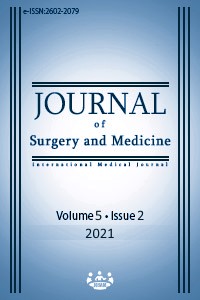Analysis of pediatricians’ knowledge about autism
Keywords:
Autism, Child Psychiatry, PediatricianAbstract
Background/Aim: In autism spectrum disorders (ASD), early diagnosis is important for treatment, and pediatricians are health professionals who are likely to encounter ASD at the earliest stages. In this study, we aimed to examine the information sources of pediatricians, their current knowledge about autism and the affecting factors. Methods: The study was conducted as an online cross-sectional self-report questionnaire and the data of 145 pediatricians were analyzed. The sociodemographic information form created by the researchers and the Healthcare Professionals' Knowledge of Childhood Autism Questionnaire-Turkish Version were filled by the participants. Correct response rates were divided into quantile values and under 3rd Quartile (Q3) was considered “insufficient information.” Logistic regression analysis was used for descriptive data and factors affecting the level of knowledge. Results: Of 145 participants, 59.3% completed Child and Adolescent Psychiatry (CAP) internship during their medical education, 60.7% completed CAP rotation, and 49.7% attended training or meetings related to autism. The highest rate of correct answers in autism knowledge evaluation questionnaire was on "Information on social interaction," while the lowest rate of correct answers was on "Information on neurodevelopmental diseases." For the total correct answer rates, the Q3 and Q1 values were 68.1% and 89.5%, respectively. According to the logistic regression model, being single (Mean: 3.60) and not having an MCS rotation (Mean: 8.49) predicted a score below Q3. Conclusions: Our research shows that in this disorder, where early diagnosis is of foremost importance, pediatricians who regularly monitor children have a high level of knowledge about recognizing autistic symptoms; however, there are some deficiencies in answering questions that will resolve the concerns of families about autism. For this reason, pediatricians who examine a child at least 3-4 times a year need pediatric psychiatry training that will give them specific skills in diagnosing and making recommendations, as well as initiating interventions. Another option is being more involved in departments that will enable them to gain experience in autism.
Downloads
References
Yıldırım AA, Çetinkol Y, Esnafoğlu E, Çalgın MK. Association of Borna disease virus with autism spectrum disorder in Turkish children. J Surg Med. 2020;4(11):986-9.
Baird G, Cass H, Slonims V. Diagnosis of autism. Br Med J. 2003;327:488-93.
Cuvo AJ. Training children with autism and pervasive developmental disorders to comply with healthcare procedures: Theory and research. International handbook of autism and pervasive developmental disorders: Springer, 2011,381-95.
Woods JJ, Wetherby AM. Early Identification of and Intervention for Infants and Toddlers Who Are at Risk for Autism Spectrum Disorder. Lang Speech Hear Serv Sch. 2003;34:180-93.
Molteni P, Maggiolini S. Parents' Perspectives Towards the Diagnosis of Autism: An Italian Case Study Research. Journal of Child and Family Studies. 2015;24:1088-96.
McCaffrey E. The maternal experience in the diagnosis of autism spectrum disorder: Chestnut Hill College; 2011.
Smith T, McAdam D, Napolitano D. Autism spectrum disorders: Applied behavior analysis, evidence, and practice. J Appl Behav Anal. 2007:1-29.
Council on children with disabilities, section on developmental-behavioral pediatrics, Bright Futures Steering Committee, Medical Home Initiatives For Children With Special Needs Project Advisory Committee. Identifying infants and young children with developmental disorders in the medical home: An algorithm for developmental surveillance and screening. Pediatrics. 2006;118:405-20.
Sudhinaraset A, Kuo A. Parents' perspectives on the role of pediatricians in autism diagnosis. J Autism Dev Disord. 2013;43:747-8.
Chamak B, Bonniau B. Changes in the diagnosis of autism: how parents and professionals act and react in France. Cult Med Psychiatry. 2013;37:405-26.
Erden G, Akçakin M, Doğan DG, Ertem İÖ. Çocuk hekimleri ve otizm: Tanıda zorluklar. Türkiye Klinikleri Pediatri Dergisi. 2010;19:9-15.
Lancaster BM. Assessment and treatment of autism. Indian J Pediatr. 2005;72:45-52.
Bakare MO, Ebigbo PO, Agomoh AO, Menkiti NC. Knowledge about childhood autism among health workers (KCAHW) questionnaire: description, reliability, and internal consistency. Clin Pract Epidemiol Ment Health. 2008;4:17.
Gürbüz Özgür B, Aksu H, Eser E. Validity and reliability of the Turkish version of the knowledge about childhood autism among health workers questionnaire. Psychiatr Clin Psychopharmacol. 2019;29:765-73.
Dosreis S, Weiner CL. Autism spectrum disorder screening and management practices among general pediatric providers. J Dev Behav. 2006;27:88-94.
Finke EH, Drager KDR, Ash S. Pediatricians' perspectives on identification and diagnosis of autism spectrum disorders. Early Child Res Q. 2010;8:254-68.
Karaaslan D. Examination of the opinions of families and specialist doctors involved in the diagnosis of medical diagnosis of children with autism. Postgraduate Thesis, Marmara University, Istanbul, 2015. (Turkish)
Downloads
- 776 861
Published
Issue
Section
How to Cite
License
Copyright (c) 2021 Şenay Kılınçel, Fikriye Baki
This work is licensed under a Creative Commons Attribution-NonCommercial-NoDerivatives 4.0 International License.
















